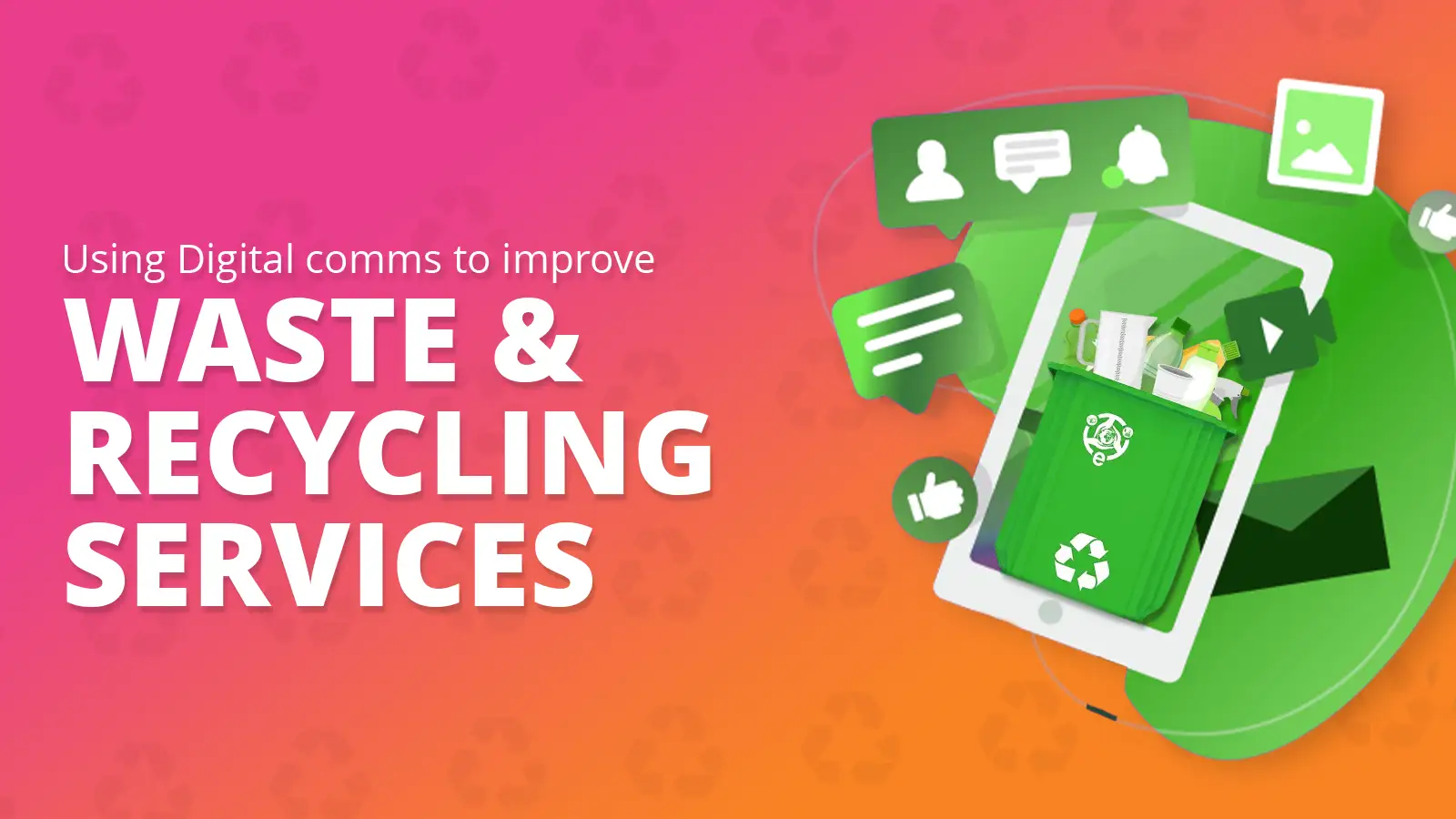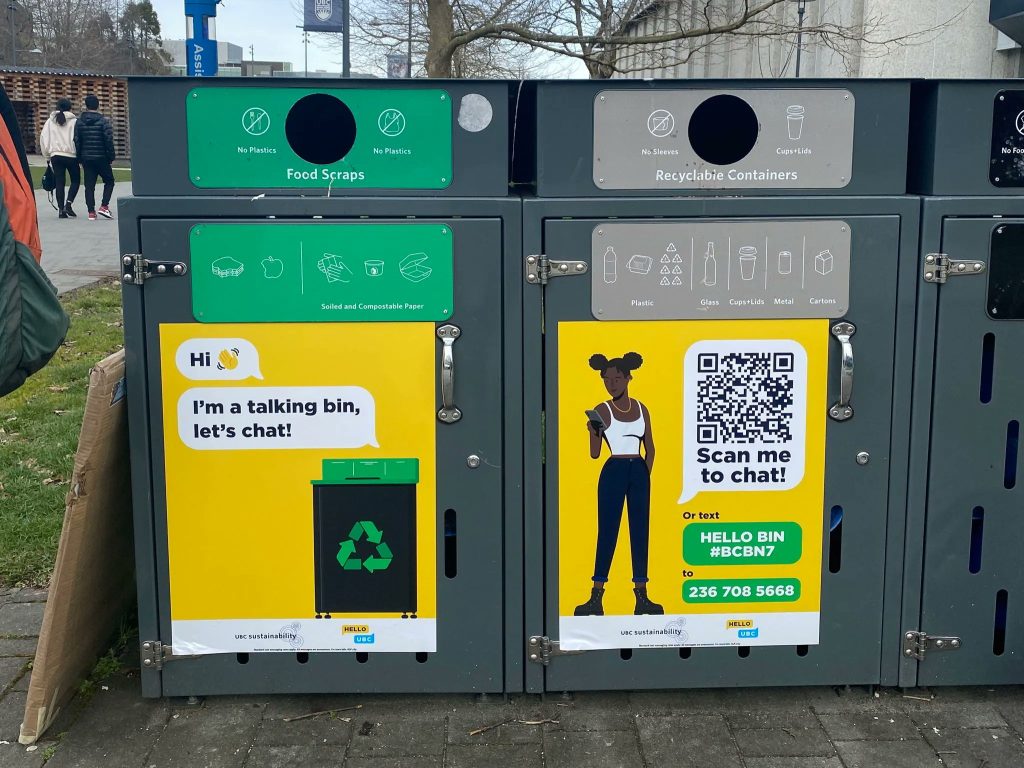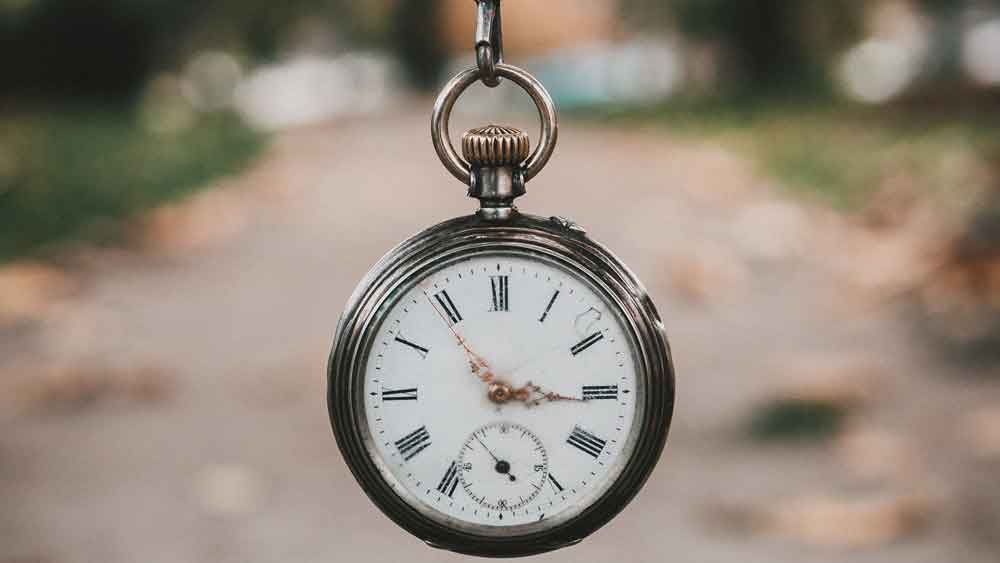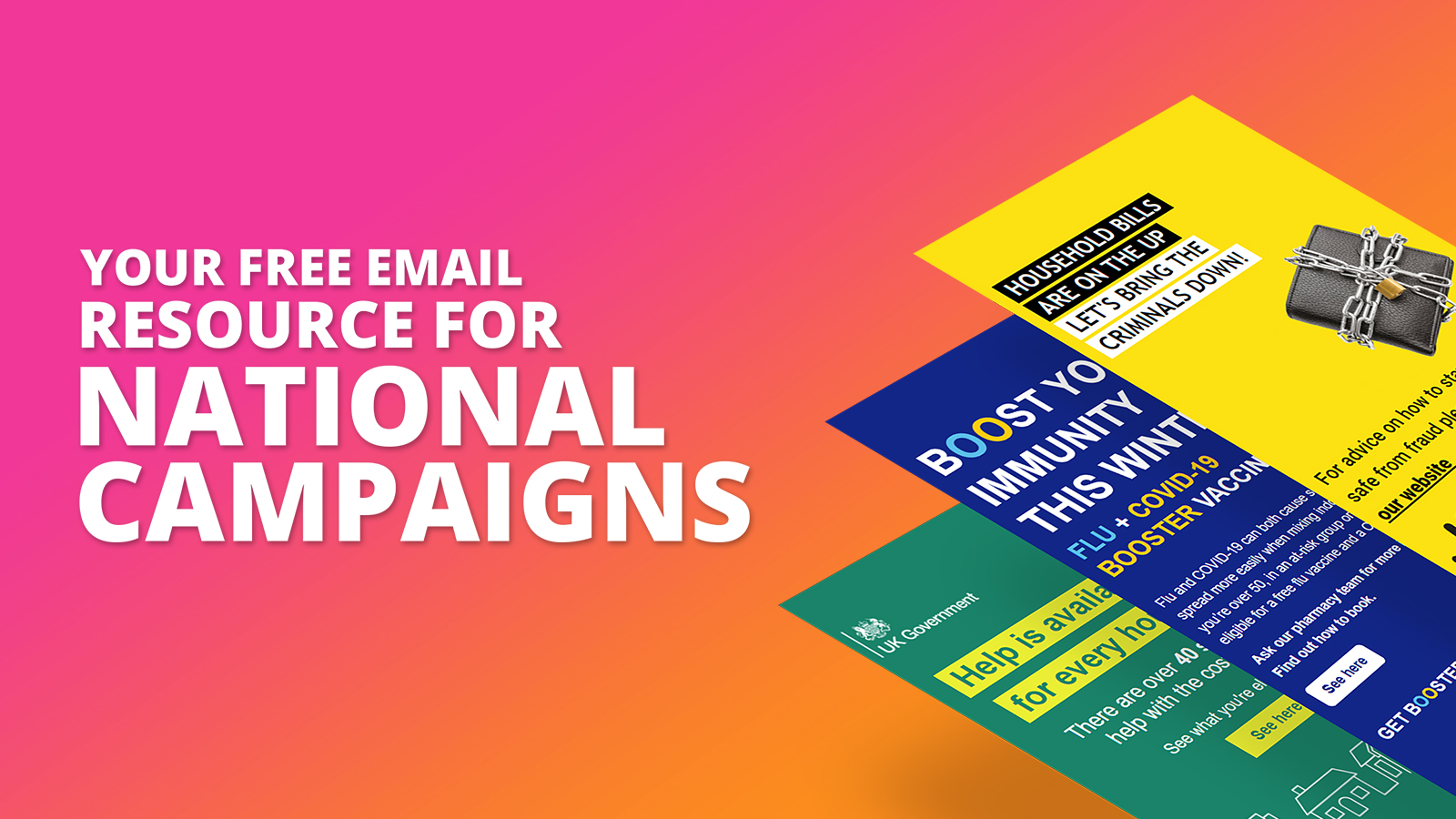Blog
CATEGORY: Public SectorAutomation
Using digital comms to improve waste and recycling services

Waste and recycling teams are collaborating closely with communications teams to create campaigns that inform, educate and engage citizens in adopting positive recycling behaviours. Improved collection services and increased recycling rates are beneficial to all parties involved. By implementing effective waste management practices and engaging citizens in positive recycling behaviours, local authorities can create a more sustainable and desirable community for all.
What are the biggest challenges in waste management?
As a labor-intensive and time-pressured operation, a significant risk to waste management is that any delays in collecting, processing and sorting can have negative implications on the rest of the process.
Authorities often experience delays because of the high volume of inquiries concerning missed pick-ups, sorting household waste and disposing of hazardous materials. It’s important to ensure that all members of the public are responded to quickly, but this can create bottlenecks in the number of high priority tasks when done inefficiently.
Waste management is an expensive and extensive operation. In fact, it’s reported that waste management averages 20% of a city’s budget annually. The financial cost of poor waste management is significantly higher than proper waste management. If communities don’t effectively manage their waste, there are hidden costs involved such as environmental damage, healthcare and lost productivity.
Total UK WfH generation was 27.0 million tonnes in 2020, an increase of 2.1% from 2019. England is responsible for the vast majority of UK WfH, generating 22.6 million tonnes (84% of the UK total) in 2020.
The UK WfH recycling rate (including IBA metal) was 44.4% in 2020, decreasing from 46.0% in 2019.
The recycling rate for waste from households decreased in all UK countries except Wales in 2020. The recycling rate for England was 44.0%, compared with 49.1% in Northern Ireland, 41.0% in Scotland, and 56.5% in Wales.
Local authorities throughout the UK are striving to improve the efficiency and effectiveness of their waste and recycling services and digital communication can help in a number of ways:
Bin collection
One of the most significant challenges faced by many councils is the high volume of resident enquiries about bin collections, which can consume a considerable amount of staff time and call centre resources. Therefore, many councils have prioritised reducing the need for this type of customer contact to enhance their waste management processes, increase recycling rates and minimise costs.
If residents know what they need to do and when, they are more likely to present the right bin at the right time and have a positive impact on local recycling rates.
To help residents remember when to put their bins out for collection, timely and personalised email or SMS reminders can be sent through a programme of automated campaigns, thereby freeing time of call centre resource enabling them to focus on other key priorities, but through the use of automation, not increasing the burden on an already stretched communications team.
Wrexham County Borough Council built a campaign to do just that. Residents subscribed to a bin collection day reminder and, after an initial welcome series to inform and educate them, followed by the regular reminder emails sent the afternoon prior to the bin collection slot (as most people put their bins out the night before the collection). Mobile optimised designs which made effective use of colour and imagery gave residents a simple remind which bin to put out - (garden waste reminders used a green colour palette, while general waste used grey).
Take a look at our template designs for inspiration:
Green bin reminder: https://news.comms.e-shot.net/yco5/Design/c7b-84e40
Black bin reminder: https://news.comms.e-shot.net/yco5/Design/c7r-qg7
Garden bin reminder: https://news.comms.e-shot.net/yco5/Design/c7d-j8279
Anyone who works in a council knows how big an issue bins can be. Questions about collections days or calls about missed bins account for a large number of calls that need to be dealt with by the customer services team. Very often the issues are as a result of people putting out the incorrect bin or by putting the wrong things in their recycling which means our teams can’t collect them.
Benefit the environment with increased recycling adoption
Having a strong engagement strategy to help residents adopt positive recycling behaviours is critical to the success of recycling schemes.
Residents need to be reminded how to use a recycling scheme and why it is important, and this communication needs to happen regularly, particularly if the area has high levels of transience. Chartered Institution of Wastes Management (CIWM), Waste on the Frontline
According to the England Local Authority and Household Waste: 2021/22 financial year, amongst the 333 local authorities in England, there is considerable variation in ‘household waste’ recycling rates, ranging from 17.7 to 63.5 per cent in 2021/22.
By capitalising on campaigns created by organisations like wrap it is possible to incorporate seasonal and topical campaigns to keep messaging fresh. For example Recycle Week which has been growing in momentum since 2004 has delivered the nation's largest recycling behaviour change campaign. (We will be including email campaign assets for this in our email library soon.)
Recycle Now™ is the national recycling campaign for England and Northern Ireland, which aims to motivate more people, to recycle more of the right things, more often.
Social influence and social proof can be extraordinarily powerful in driving behavioural change within the community – so don’t just educate on the right things to do – show people what their neighbours are doing well too!
Recycling reminder template:
However, the data in WRAPs Recycling Tracker highlights that 87% of UK households recycle one or more items which are not accepted in the kerbside recycling and 57% miss one or more items which could be recycled at the kerbside. And whilst the focus on increased recycling will help educate on missed recycling opportunities – contamination is another area where digital communications also have a role to play.
Cut costs with contamination reduction
According to the WRAP Recycling Tracker Report, Nov 22, while contamination has fallen in 2022 it remains widespread with 83% of UK citizens putting items in the recycling that is not accepted locally. This contamination is largely focused on various types of glass (Pyrex, drinking glasses, mirrors and light bulbs) as well as a range of plastics and pouches. There is clear evidence that contamination is a result of citizens wanting to recycle as much as they can and lacking (or feeling that they lack) sufficient guidance on what can and can’t be recycled.
Contamination matters. It costs the council money in processing fees and penalties, ruins the hard work of those recycling correctly and contributes to climate change through the disposal of valuable resources. It costs councils almost three times more to dispose of contaminated waste per tonne than recyclable, leading to some councils resorting to “If in doubt, keep it out” campaigns, but there is another way.
Kirklees trialled an email campaign to target residents in two particular bin collection rounds, where contamination rates were high.
This intervention targeted households the evening of their recycling bin collection, and the key messages were included in subsequent collection reminders too. The campaign educated residents about what can and can’t be recycled, and asked them to acknowledge that they’d read the guidance by clicking a button in the email.
In other locations a trial using an ai chat facility engages residents at their bin, through a QR code on a sticker – so they can ask if something is recyclable or not whenever they are unsure. Answering the question at the point that the resident needs to know, as well as reinforcing the education through the routine bin collection reminder emails is proving to be incredibly successful.

Generate increased revenue with garden waste adoption
65% of all local authorities in England now charge for garden waste collections as a non-essential, opt-in service. Across the country, more than £83 million is being earnt by councils from garden waste collection.
For example, Wiltshire Council set an initiative to charging residents £40pa to have garden waste collected, hoping to make a cost saving of ~£800,000 a year. But the scheme has proved so popular, it now looks set to save £1.6 million.
With at least 67,000 households signed up, the council can expect a yearly gross income of almost £2.7 million from the scheme. Whilst garden waste is only a small percentage of the overall waste budget, which is more than £30 million, with mounting budget pressures every little helps.
Havering used their digital newsletter to promote their chargeable garden waste programme both to encourage new subscribers and increase renewal rates. The newsletters drive people to transact online, reducing call centre demand and making the transaction process easier for the customer.
Using automated email reminders
With the Havering example, in the first year of introducing targeted and timely email reminders, renewal rates increased by 375%, reducing service inefficiencies and running costs. Three years on and more than 90% of customers were renewing on time, and nearly three quarters of renewals were completed online or via an automated phone system (and therefore do not require customer service interaction).
These renewal reminders are simple to set up and as a date-driven automation do not place additional burden on the communications team to administer.
Garden bin renewal example template - https://news.comms.e-shot.net/yco5/Design/c7u-27hh5
Reminder template: https://news.comms.e-shot.net/yco5/Design/c7f-82445
Sum-up
A good waste and recycling service offered by local authorities can provide numerous benefits that contribute to a more sustainable, healthier and economically vibrant community.
The WRAP Recycling tracker continues to find that there is a high correlation between recycling performance and higher resident satisfaction with their waste and recycling services.
There are great examples of councils using high-impact, low-complexity campaigns to both cut costs and increase revenue, which when targeted well can have huge benefit. Through the use of simple automations, councils can offer a better service, as well as reducing cost for cutting call-centre costs, without additional burden on already busy comms teams. Many of these examples are from several years ago, but the strides in "big data" and indeed the proliferation of data being collect can help these campaigns ben even more successful - just as the Kirklees example demonstrated.
Solutions
Email marketing healthcheck
We are confident that we can help you, which is why we offer a free healthcheck to identify potential issues with your current programme and free advice on things that could be done to improve it.


